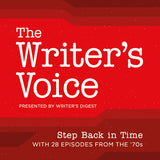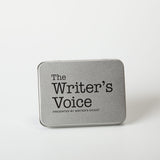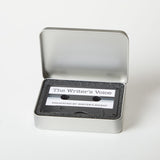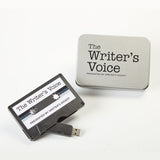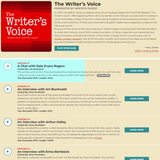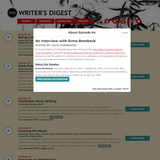The Writer's Voice USB Drive
Step back in time and listen to The Writer’s Voice, a collection of 28 historic Writer’s Digest recordings originally available as cassettes by mail order in the 1970s. Now a USB drive cleverly disguised as a cassette tape, this product contains nearly 30 hours of wide-ranging content from blockbuster interviews to panel discussions to timeless writing instruction. It’s a fascinating snapshot of the publishing industry in the 1970s and will add invaluable insight about legendary writers to the historical record.
About the Recordings
- A Chat with Dale Evan Rogers, hosted by Lois Rosenthal (47:30)
The actress, and author of several bestselling inspirational books, talks about why and how she wrote her books, and about her deep religious faith that inspired them.
- An Interview with Art Buchwald, hosted by Alice Hornbaker (43:51)
Buchwald, known as one of the great syndicated humorists of his time, shares how he got started as a stringer for The Variety in Paris and worked his way up the syndication ladder. In addition to speaking about writing for various audiences, handling humor, and the importance of encouraging other writers, he touches on people who are going to make it and what topics are (or were) taboo.
- An Interview with Arthur Hailey, hosted by Alice Hornbaker (1:21:00)
Hailey, a bestselling novelist, is interviewed by Alice Hornbaker. During their discussion, Hailey opines on newspaper writers versus book writers, the importance of planning in novel writing, and on permanence versus storytelling. Plus, he added an appendage to the end in which he reads specific notes from research interviews for his bestselling novel, Wheels.
- An Interview with Erma Bombeck, hosted by Alice Hornbaker (1:07:17)
Bombeck, a popular syndicated humorist, is interviewed by Alice Hornbaker. During their discussion, Bombeck discusses the importance of suburban newspapers, how many columns she writes at a time, and family reactions to her writing. Plus, she points out the importance of reading humor and observes how style projects out of people.
- An Interview with Gay Talese, hosted by John Brady (1:26:05)
Talese, considered to be the father of “New Journalism” writing, talks about the research and writing of his bestselling novels, Honor Thy Father and The Kingdom and the Power. He discusses his interviewing techniques, his “new journalism” style of writing, what it is, and what he is trying to do with it. This is an exciting interview with one of our leading writers.
- Being a Writer with James Michener, hosted by John Hayes (1:27:04)
The internationally famous author reveals how a Michener bestseller is researched and written; how he develops his characters; and the kind of characters he looks for in real life. He also talks about the functions and fun of being a writer.
- Book Publishing and the Writer featuring Ken McCormick, hosted by John Brady (1:24:36)
Ken McCormick, one of the most celebrated book editors of the 20th century, shares the realities of book publishing for writers. This includes breaking down contracts, including percentages, various book clubs, the hierarchy of the publishing business, how bestselling authors help sponsor debut authors (and finance poetry and short story collections), and the two benefits of TV on book publishing.
- Confession Story Writing, hosted by Dorothy Byrd (44:19)
A currently selling confession writer shows you how to tell your story. Using personal experiences as a springboard, she shows which elements, and in what proportions, are needed to produce the kind of story confession that editors welcome. She even reviews the ten steps to cover in revising your story.
- Creating the Novel: A panel featuring Merle Miller, Gerald Green, Irving Schulman, Harry Mark Petrakis, Jerome Weidman, hosted by Milton White (1:21:30)
Featuring: Milton White, Merle Miller, Irving Schulman, Harry Mark Petrakis, Gerald Green, and Jerome Weidman. How much research is necessary in a novel? Petrakis tells about his father’s death and how he used it in his writing. Weidman shares some of the hazards of being a novel writer. The panel members offer their ideas in a very candid roundtable on novel writing.
- Hotchner on Hemingway, hosted by A.E. Hotchner (1:23:46)
The bestselling author of Papa Hemingway talks about his years with Hemingway; what “Papa” was really like; his relations with his friends; how he really felt about his father and mother; his unopened letter to his father; his illness and suicide; and the lawsuit over the publication of Papa Hemingway. Hotchner also talks about his own writing and work methods.
- How an Agent Can Help a Writer featuring Philip Spitzer, hosted by John Brady (1:30:02)
In an interview, New York literary agent Philip Spitzer provides some of the most sought-after answers about the functions of a literary agent and how he can help a writer to sell and discuss his work—and get more for it. This candid discussion includes things like: “How difficult is it for a new writer to get an agent?”; “What is required for you (the literary agent) to take on a new writer?”; “What advice would you give to someone who has a manuscript that he or she thinks is salable and who is looking for an agent?”
- How Novelists Work: A panel featuring Arthur Hailey, Rona Jaffe, Vance Bourjaily, Ken McCormick, hosted by Milton White (1:13:31)
These panel members discuss the work methods they use when writing novels. Editor McCormick, of Doubleday fame, talks about the various aspects of marketing a novel. And panel moderator, White, a selling novelist in his own right, adds his insight into the working methods of successful novelists.
- Isaac Asimov Talks: An Interview, hosted by Lois Rosenthal (1:01:03)
One of our most widely known writers talks about his writing, literary responsibilities and discipline. Asimov also gives solid advice for new SF writers.
- Learning to Write the Short Story, hosted by Jesse Hill Ford (58:37)
At a writer’s conference, Ford tells how short stories are written and better writers made. He discusses his theory on the three things you need to do to become a finished writer, how to work toward publication and what to do to improve your writing. After exposing his views on short story writing, he answers questions from the audience.
- Novel Writing, hosted by Harry Mark Petrakis (56:37)
Bestselling novelist Harry Mark Petrakis discusses writing as a profession and what to do to make yourself a better writer.
- The Making of a Salable Article featuring Marj Jackson Levin, hosted by Alice Hornbaker (49:34)
An informative tape on what is needed to put together a salable magazine article. Marj Jackson Levin, a top freelance writer, and Alice Hornbaker, a former Editorial Director of Writer’s Digest School, hold a free-wheeling conversation on writing and selling to the lucrative article market. They cover everything: creating the idea, researching, and writing and selling the finished product.
- The Mechanics of Writing, Part 1 featuring Dr. Eugene Etheridge, hosted by John Brady (56:53)
A professor of English presents the most needed rules governing: punctuation marks; working titles; using capital letters; writing numbers, date and time; agreement between subject and verb; and the use of adjectives and adverbs.
- The Mechanics of Writing, Part 2 featuring Dr. Eugene Etheridge, hosted by John Brady (54:14)
A professor of English presents the most needed rules governing: punctuation marks; working titles; using capital letters; writing numbers, date and time; agreement between subject and verb; and the use of adjectives and adverbs.
- The Writing and Teaching of Poetry: An Interview with Kenneth Koch, hosted by Lois Rosenthal (53:56)
One of the most successful teachers of poetry, especially to children, talks about how he teaches. Koch also gives a general discussion of his writing and poetry.
- Where and How to Market What You Write, hosted by Kirk Polking (1:07:49)
During her stint as Editor of Writer’s Digest, the nation’s leading magazine for writers, Polking became one of the foremost experts on where and how to sell manuscripts. Now she has put much of this information on tape. If you’re interested in selling your manuscripts to the right market for the right money, this selection has the information you need.
- Writing Biography, hosted by Maurice Zolotow (52:48)
Maurice Zolotow, an author of celebrity biographies, leads a presentation on how to write effective biographies. He shares how he breaks up the book-writing process to avoid the intimidation of writing an entire book, the several pitfalls that can trap a biographer, and why biographies should include storytelling techniques and avoid strict chronological order.
- Writing Popular Fiction featuring Eileen Jensen, hosted by John Brady (1:21:43)
A writer who has sold fiction to the nation’s top magazines tells you about the system she used to break into print; how she learned the editorial slant of the magazines she wanted to write for; and what every writer has to recognize before he or she can sell steadily. Also discussed are the kind of stories that sell; eight sources of story ideas; how to begin writing your story; how to write flashbacks; and the three different kinds of transitions. Finally, a formula for successful stories—one you can apply to any stories you write.
- Writing Science Fiction, Part 1, hosted by Roger Zelazny (1:01:37)
A top-selling science-fiction writer tells how he got started in the SF field; how receptive the SF market is to new writers; the taboos and how Harlan Ellison blew them apart; how to get ideas; how much science background a writer needs; and the difference between “chess problems” and “extrapolation” SF stories. He also discusses the “Nebula” and “Hugo” awards and their help to a writer; the differences between SF writing and mainstream.
- Writing Science Fiction, Part 2, hosted by Roger Zelazny (51:07)
A top-selling science-fiction writer tells how he got started in the SF field; how receptive the SF market is to new writers; the taboos and how Harlan Ellison blew them apart; how to get ideas; how much science background a writer needs; and the difference between “chess problems” and “extrapolation” SF stories. He also discusses the “Nebula” and “Hugo” awards and their help to a writer; the differences between SF writing and mainstream.
- Writing the Basic Article featuring Berniece Roer Neal, hosted by Harry Edward Neal (30:43)
The author of hundreds of articles which have been published in many national magazines tells you how to put your big idea on paper—and how to express it in one sentence. Neal shows you the basic ingredients needed to write salable articles.
- Writing the Basic Short Story featuring Harry Edward Neal, hosted by Berniece Roer Neal (26:08)
A former FBI agent and the author of numerous short stories and novels, Neal gives simplified and specific formula for writing the short story.
- Writing the Nonfiction Book, hosted by John Charles Cooper (43:16)
John Charles Cooper, a prolific nonfiction author and freelance writer, explains the difference between nonfiction articles and books; how to go about researching a nonfiction book; the importance of writing the first draft as fast as possible; and “the most painful task possible.” Plus, he shares the reasons most nonfiction books fail and gives examples of chapter divisions in books.
- Writing the Poem, hosted by Paul Engle (1:04:22)
Paul Engle, award-winning poet and long-time director of the Iowa Writers’ Workshop, gives a presentation on the art of writing poetry. He discusses Plato, John Keats, Fanny Brawne, Robert Frost, Ernest Hemingway, and more. Plus, he answers questions from the audience, including whether learning a foreign language helps with writing poetry.
Not all of the audio is perfect and some of the ideas are a bit dated, but we’re thrilled to finally be able to share this extraordinary find with you. Just pop the USB into your computer and enjoy!
Compatible with desktop computers and laptops with ChromeOS, Linux, MacOS 10+ or Windows 10+. One USB type A port is required, along with the most recent version of Chrome, Edge, Firefox or Safari browsers. NOT compatible with iPads, iPhones, tablets or smartphones.







